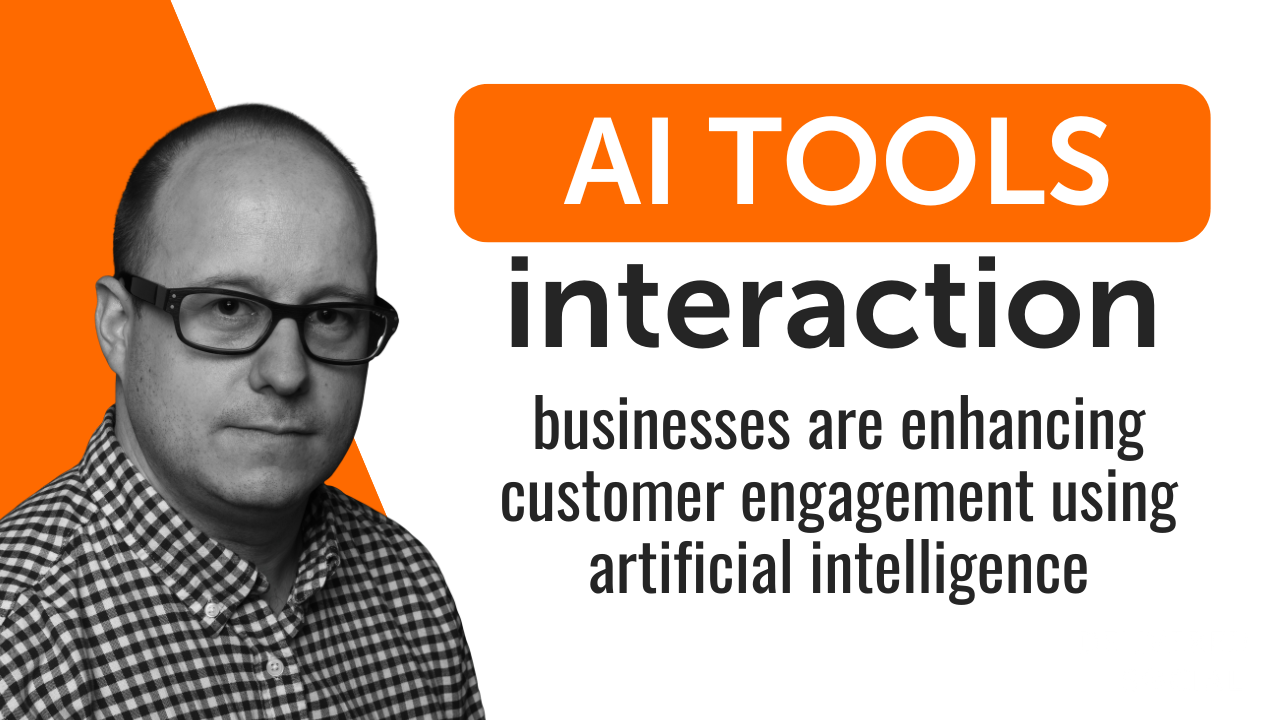
Engaging customers is the backbone of improving your user experience and achieving long-term success in any business. Since customers have so many alternatives nowadays, building long-term relationships is more important than ever. The key to doing this is to keep customers satisfied and AI is the key to doing so since it completely transforms how people interact with customers and serve them.
AI tools are now starting to become more important than ever and are used for enhancing the user experience. In this article, we'll dive deeper to learn more how you can improve customer engagement by using AI-powered tools.
Personalisation In Customer Experiences
71% of customers expect businesses to deliver personalised interactions. This number is growing each year so this means if you want to leave a good first impression, you'll need to make sure that customers feel at home and know that you have them covered from the beginning.
By leveraging data and advanced tech tools, businesses can create deeper connections with their audience and improve customer satisfaction.
There are several different ways on how you can personalise customer experiences.
- Using an AI-powered avatar generator: AI-powered avatar generators are an innovative way to personalise customer experiences by creating customised visual representations of users or characters that align with a users personality and preferences. AI-powered avatars are most commonly used in e-commerce, gaming and entertainment, customer support, education and training, and more.
- Segmentation: Grouping customers based on common traits like age, locations, preferences, and purchasing patterns. AI also has the power to implement dynamic segmentation which adapts to customer behaviour changes.
- Personalised content: Creating emails, advertisements, and product recommendations based on individual customer interests. You can also customise web experiences based on the user's behaviour.
- Omni-channel personalisation: Personalising experiences on all mediums is highly important– website, email, social media, in-store, and customer support. For example, if a customer abandons their cart online, you can send a reminder via SMS or email with a discount to make them interested again.
Personalisation is important for increasing customer satisfaction, brand loyalty, conversion rates, and increasing overall engagement.
Task Management Tools
Task management software powered by AI can significantly help enhance customer engagement by improving personalisation, efficiency, and responsiveness. AI-driven task management tools analyse customer data and prioritise tasks that have the most immediate impact on engagement, such as responding instantly to users and personalising outreaches.
Moreover, they help in automating repetitive tasks like email follow-ups, making sure that you are interacting with all customers and not missing out on anyone. Also, AI helps in allowing teams to effectively collaborate by automatically assigning tasks, setting reminders, and managing deadlines.
It has features that align cross-departments such as syncing marketing, sales, and customer service teams to present a unified front to customers.

Consent Management Tools
AI-powered consent management tools are essential for organisations trying to manage user consent efficiency and comply with privacy regulations like the General Data Privacy Regulation (GDPR) and the California Consumer Privacy Act (CCPA). These tools leverage AI to streamline consent collection, making sure that the customer's data is in safe hands.
AI-powered consent management tools can automate consent collection by analysing website or app usage and provide appropriate consent prompts dynamically and support multi-channel consent collection. Moreover, they can monitor changes in privacy laws and automatically update consent processes to ensure compliance.
Natural Language Processing (NLP) features can provide clear explanations of privacy policies by using plain language and supports multi-language capabilities for global audiences. Moreover, AI maintains detailed records of user consent for audits and regular compliance. It can generate real-time reports to track consent trends and data handling activities.
AI-Powered Chatbots And Virtual Assistants
Roughly 50% of customers reported that they have spoken to AI chatbots when interacting with a website. These AI tools represent an entirely new level of efficiency and availability for SaaS customer support. Especially considering the fact that they are available 24/7, and let's face it, no matter how many hours humans can work, they'll never be able to work all day, everyday, to answer your inquiries.
Let's dive deeper and take a look at what are the advantages of using AI chatbots in customer support and how they impact customer engagement:
- 24/7 support: This is highly important, especially if you are targeting a global audience that lives in different time zones. This helps in eliminating frustration caused by having to wait hours for a reply and improves user satisfaction.
- Instant response: Before chatbots existed, not only did people wait hours for a reply, customer support teams also had a harder time when they got back to the office. This was because they had to reply to a large number of people and sometimes, it resulted in confusion and less satisfied people because of the long waiting hours.
- Reduces repetitive work: Quickly answers common answers about your product or service, and frees up your customer support team from repetitive work.
By handling customer inquiries and automating routine tasks, AI allows human support staff to focus on issues that deal with creativity, empathy, and in-depth product knowledge.

Voice of Customer (VoC) And Sentiment Analysis
Tools for VoC and sentiment analysis use AI to help businesses collect customer feedback and act on it. By using this method, AI is taking what customers have to say into consideration which affects the decision making process of the company.
This is done in the following ways:
- Monitoring customer feedback: Analyses text from multiple channels such as social media, and identifies all common issues and trends.
- Real-time sentiment tracking: Tracks purchasing behaviours and will adjust recommendations based on how the user is feeling and will notify you of real-time changes in sentiment.
- Real-time predictions: Will identify any potential issues based on sentiment patterns and will allow actions to be taken to address them when needed.
The advantages of sentiment analysis is that they are faster at addressing any potential issues, improve the product development phase, and make sure that customers are satisfied with real-time support.
Social Media Monitoring
Social media channels are now the main source of communication. This means that it's a direct way to communicate with your audience and make sure that you are addressing all of their concerns directly. AI has changed the game and there are many tools available that leverage AI to track, analyse, and respond to online conversions, mentions, and trends across all social media platforms.
This approach allows brands to gain real-time insights, manage online reputations, and create more targeted strategies. Let's take a closer look at how AI manages to enhance social media monitoring:
- Automated data collection: AI tools organise and scrape large amounts of data from social media channels, blogs, and forums. They also handle multilingual content, including videos, text, and images.
- Sentiment analysis: Identifies the tone of comments or posts and uses NLP to detect slang, context, and sarcasm for more accurate sentiment classifications.
- Trend detection: Monitors hashtags, keywords, and conversations to identify emerging trends. Afterwards, it can also predict what topics will gain traction based on historical data.
- Crisis management: Sets up alerts for sudden spikes in negative mentions and provides actionable insights to address issues before they escalate on a larger scale.
- Customer insights: AI identifies patterns in customer preferences and behaviour. Moreover, it analyses audience demographics, customer engagement habits, and content preferences.
AI tools are mostly used on social media channels for detecting and responding to any customer queries or complaints instantly. They can evaluate marketing campaign performance and even identify user-generated content (UGC). Also, during the product development phase, they gather feedback and can identify common issues.
Otherwise, AI-driven social media monitoring offers real-time insights and provides immediate access to data that allows timely decision-making. AI tools can handle large volumes of data from multiple sources, which is important when you have a larger fanbase that you need to address.

AI Is Making Customers Interactions Much Easier Than Before
AI is continuing to evolve and it doesn't just stop there. It's making customer interactions much easier like never before and is automating the customer experience, serving as a decision-maker and mediator alongside humans at key customer touch points.
In the future, we might see different innovations from AI, but as for now, it has certainly made things much easier for business owners and customers. While you focus on more important tasks, AI will still make sure that you are providing customers with the best experience possible!
Interested In Working Together?
Introducing Delivered Social. We're The Most-Rated Digital Agency In Surrey & Hampshire – We've Got To Be Doing Something Right.
Delivered Social is a digital marketing agency with one mission—to help businesses grow. We're famous in Guildford and Portsmouth for our social clinics. We believe in free advice. We build lasting relationships because our team prides itself on being helpful, which our clients appreciate.
If you are looking for a new website or an agency to manage your social media presence, we can help.
If you need something slightly different, here's a super handy list of all our services, or you can always email us.























